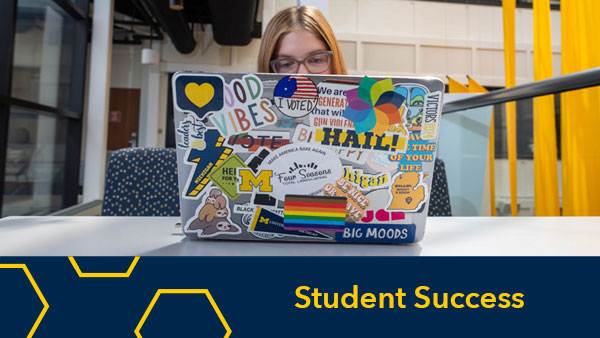
Sean Corp, Communications Lead
Online Teaching, a newly redesigned website created by the Center for Academic Innovation, provides U-M faculty with resources to improve their skills in online teaching to serve students engaged in entirely online, hybrid, or blended learning experiences.
The website was initially launched in response to the pandemic in March 2020 to help faculty with emergency remote teaching. While that provided valuable information to faculty unfamiliar with remote tools or remote instruction, it was time to think beyond that immediate need, said James DeVaney, associate vice provost of innovation and the center’s founding executive director. It was time to build something that served the university’s long-term goals and its faculty’s needs.

“The launch of the first iteration of Online Teaching was a great example of rapid response and collaboration in the early days of remote teaching. This 2.0 version improves the design and resources and allows us to better serve the campus community,” DeVaney said.
The site has been reconceived and redesigned to serve as a dedicated resource for faculty, containing articles, step-by-step guides, and information on compliance and regulatory issues related to online instruction.
The content available at Online Teaching is created and curated by Center for Academic Innovation staff members, who play critical roles in all levels of course creation. The content on the site covers content creation, media production, learning experience design, integration of educational technology, and plans for the future, including focusing on emerging issues such as artificial intelligence, virtual production, and more.
The site lives at the intersection of pedagogy, technology, and research-driven practices, said Sarah Dysart, senior director of online learning at the center.

“There are many places around the university designed to support instructors, but our school and college partners told us they needed on-demand resources that are easily accessible and explain both the technical realities of online instruction and the core pedagogical principles that could allow them to best serve online learners,” she said.
“Whether you are just getting started building content for an online course or are already familiar with online teaching but want to explore new technologies or innovative pedagogical practices, you will find helpful resources at Online Teaching.”
Short explainer articles that explore emerging issues or foundational topics related to online instruction make up most of the site’s content. These articles cover pedagogy, technology, and research issues, and users can filter the articles that match their experience level.
Some guides walk faculty through every phase of creating an online course designed to make it easy for faculty to find the right guide for where they are in the creation process. The site also has sections dedicated to compliance issues in online teaching and information on the latest innovative practices, including the utilization of educational technology, the development of extended reality experiences for online learning, and additional ways technology can help faculty reach their learning objectives.
“We want this site to continuously evolve because online education, the technology that facilitates this mode of instructional delivery, and recommended practices are always evolving. As we incorporate new technologies, identify innovative or novel practices, and learn what is working for new populations of global learners through research, we will share it on the site,” Dysart said.


